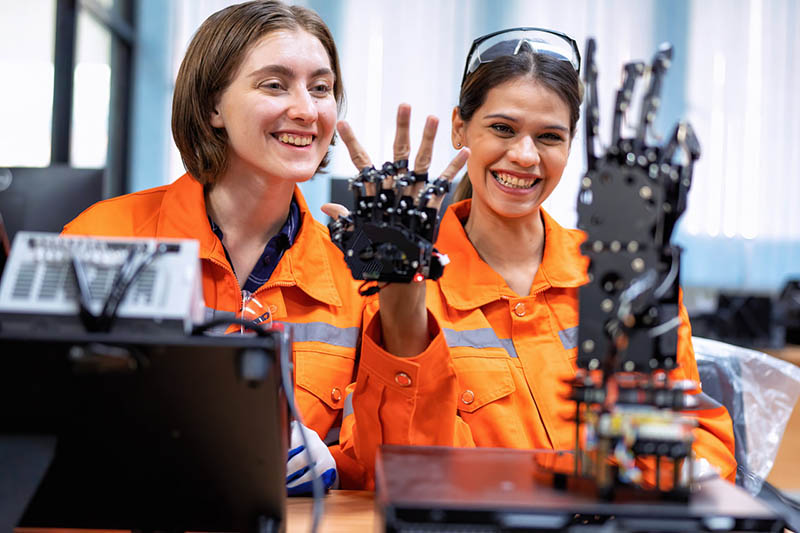AI's Triumph: Transforming the IT Landscape Forever
1. Introduction
Brief overview of artificial intelligence (AI)
Importance of AI in the IT industry
2. Evolution of AI in IT
Historical perspective
Milestones in AI development within IT
3. AI Applications in IT Operations
Automation of routine tasks
Predictive maintenance using AI.
Enhancing cybersecurity with AI
4. Improving IT Efficiency
Streamlining workflows
Data analysis and decision-making support
5. Challenges and Concerns
Ethical considerations
Job displacement fears
Security and privacy issues
6. AI in Software Development
Code generation and optimization
Testing and debugging with AI assistance.
7. Impact on IT Infrastructure
Cloud computing and AI integration
Scalability and resource optimization
8. Future Trends in AI and IT
Machine learning advancements
Integration with emerging technologies
9. Benefits for IT Professionals
Skill enhancement opportunities
Creating new job roles
10. AI and IT Collaboration
Synergies between AI and human expertise
Examples of successful collaborations
11. Case Studies
Real-world examples of AI implementation in IT
Measurable outcomes and success stories
12. Ethical AI Practices in IT
Importance of responsible AI use
Industry guidelines and standards
13. Overcoming Resistance to AI Adoption
Addressing common concerns
Demonstrating tangible benefits
14. The Global Impact of AI in IT
Economic implications
International collaboration in AI research
15. Conclusion
Recap of key points
Future prospects of AI in the IT landscape
The Impact of Artificial Intelligence in the Field of IT
1. Introduction
In the ever-evolving landscape of technology, artificial intelligence (AI) has emerged as a transformative force, significantly impacting various industries. One sector where the impact is particularly profound is Information Technology (IT). This article explores the multifaceted influence of AI on IT, ranging from operational efficiency to ethical considerations.
2. Evolution of AI in IT
The integration of AI into IT is not a recent phenomenon. A historical overview reveals a gradual evolution, marked by key milestones. From early rule-based systems to the current era of machine learning, AI's journey in the IT realm has been characterized by innovation and adaptation.
3. AI Applications in IT Operations
Automation is a cornerstone of AI implementation in IT. Routine tasks, once manual and time-consuming, are now seamlessly executed by AI algorithms. Predictive maintenance, another application, ensures that IT systems operate at peak performance by foreseeing potential issues. Furthermore, AI contributes significantly to cybersecurity, identifying and mitigating threats in real-time.
4. Improving IT Efficiency
Streamlining workflows and optimizing data analysis are areas where AI shines. IT professionals can leverage AI tools for enhanced decision-making support, leading to more efficient and informed choices. The marriage of AI and IT has resulted in a symbiotic relationship, with each complementing the strengths of the other.
5. Challenges and Concerns
However, this integration is not without its challenges. Ethical considerations surrounding AI use, fears of job displacement, and concerns related to security and privacy pose significant hurdles. Acknowledging and addressing these concerns is crucial for fostering responsible AI adoption in the IT industry.
6. AI in Software Development
AI's impact extends into software development, where it aids in code generation, optimization, and even testing and debugging. The collaboration between human developers and AI algorithms has led to more robust and efficient software solutions.
7. Impact on IT Infrastructure
The fusion of AI and cloud computing has reshaped IT infrastructure. The seamless integration allows for enhanced scalability and resource optimization. IT professionals now have the ability to manage and scale infrastructure dynamically, responding to changing demands.
8. Future Trends in AI and IT
Looking ahead, machine learning advancements and integration with emerging technologies present exciting possibilities. The future holds the promise of even more sophisticated AI applications, transforming the IT landscape in unprecedented ways.
9. Benefits for IT Professionals
Amid concerns about job displacement, AI presents opportunities for skill enhancement. IT professionals can embrace AI as a tool that augments their capabilities, creating new job roles that align with the evolving technological landscape.
10. AI and IT Collaboration
Successful collaboration between AI and human expertise is evident in various sectors. From healthcare to finance, instances of synergies between AI and human professionals showcase the potential for a harmonious partnership.
11. Case Studies
Real-world examples demonstrate the tangible benefits of AI in IT. Case studies highlight successful implementations, providing insights into measurable outcomes and illustrating the adaptability of AI solutions.
12. Ethical AI Practices in IT
As AI continues to evolve, ethical considerations become paramount. Promoting responsible AI practices in the IT industry involves adhering to guidelines and standards, ensuring that the benefits of AI are realized without compromising ethical principles.
13. Overcoming Resistance to AI Adoption
Addressing common concerns is essential in overcoming resistance to AI adoption. Demonstrating tangible benefits, providing comprehensive training, and fostering a culture of innovation can contribute to a smoother transition to AI-driven processes.
14. The Global Impact of AI in IT
Beyond individual organizations, the global impact of AI in IT extends to economic implications and international collaboration. Countries and industries that embrace AI innovation are poised to gain a competitive edge in the global market.
15. Conclusion
In conclusion, the impact of artificial intelligence in the field of IT is transformative and multifaceted. From operational efficiency to ethical considerations, the integration of AI presents both challenges and opportunities. As technology continues to advance, the collaboration between human expertise and AI capabilities will shape the future of IT.
16. FAQs
Is AI replacing jobs in the IT industry?
While AI automates certain tasks, it also creates new opportunities and job roles, requiring a shift in skill sets.
How can IT professionals adapt to the AI-driven future?
Continuous learning, upskilling, and embracing AI as a tool for augmentation are key strategies for IT professionals.
What ethical considerations are associated with AI in IT?
Ethical concerns include privacy, bias, and the responsible use of AI algorithms in decision-making processes.
Are there risks of AI in cybersecurity for IT systems?
While AI enhances cybersecurity, there are risks associated with malicious use of AI, emphasizing the need for robust security measures.
How can organizations overcome resistance to AI adoption?
Organizations can address concerns through education, transparent communication, and showcasing the tangible benefits of AI implementation.


